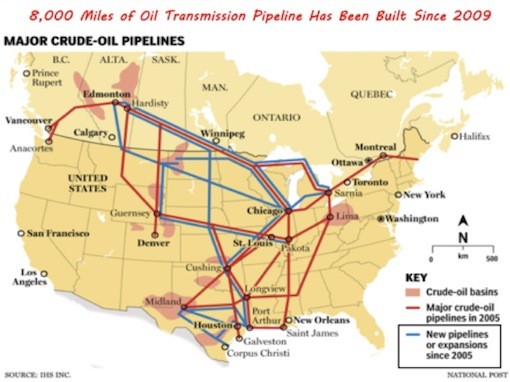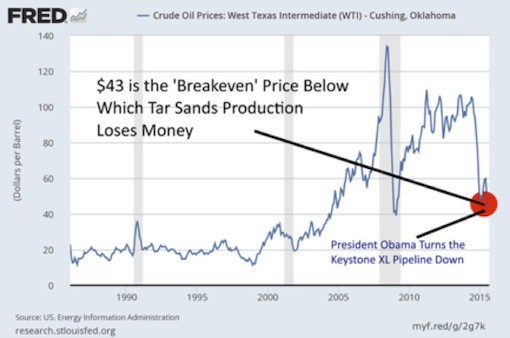The case for reforming existing political economy is easy to understand but increasingly difficult to support. On the side of reform are the large, complex and interrelated political and economic relations that are now critical to feeding, clothing and housing hundreds of millions of people. Against reform are the institutions that support social irresolution in favor of a political economy of mass suicide. The Keystone XL pipeline that was recently ‘killed’ (temporarily set aside) to much self-congratulation by the long-suffering green-left is the near perfect project for resurrection under the ISDS (Investor-State Dispute Resolution) mechanism central to the TTP (Trans-Pacific Partnership) and TTIP (Trans-Atlantic Trade and Investment Partnership) ‘trade’ agreements being promoted by pipeline killer Barack Obama.
In his role as political leader Mr. Obama made the political proclamation regarding Keystone XL while undermining it through expansion of supra-national judicial authority with the ISDS. The ISDS is a civil shakedown mechanism adjudicated by corporate lawyers that supersedes civil governance through making awards for ‘lost’ corporate profits. Profits are ‘lost’ when governments act in the public interest through prohibiting destructive, but potentially profitable, behavior by corporations. The Keystone XL pipeline threatens contamination of the Ogallala Aquifer with oil spills and will deliver dirty-oil for export further exacerbating global warming. However, neither polluting the Aquifer nor exacerbating global warming has been made illegal while limiting the most egregiously destructive behavior by corporations does crimp ‘potential’ profits.

Chart (1) above: while environmental activists were focused on stopping the 1,179 mile Keystone XL pipeline project the oil and gas industry built 8,000 miles of alternative pipelines to transport dirty oil from Canada through the U.S. for export. It hardly seems an accident that U.S. President Barack Obama waited until oil was below the breakeven price of $43 (Graph (2) below) to announce that he would prohibit the now (temporarily) economically unviable pipeline project. That the U.S. military is the largest institutional consumer of oil and gas and its central mission in recent decades has been to ‘liberate’ fresh supplies should help clarify the depth of the political challenge that stands in the way of effective ‘reform.’ Source: National Post.
The position of the reform-oriented left appears to be that future outcomes will be mediated through political activism designed to sway a ‘rational’ political center. Left unconsidered is that there is no straightforwardly rational center to sway. The political challenge of reform is to tie local rationalities like collecting campaign contributions and serving powerful constituencies to preventing wholesale irrationalities like global warming. The political paradox in need of resolution is that these very-same powerful constituencies benefit from environmentally destructive economic production. The goal of pending ‘trade’ agreements is to resolve this paradox by granting corporations the power to be paid whether they pollute (through profits) or don’t (through economic awards for ‘foregone’ profits).
The current conundrum is economics posed as politics— ‘soft’ political solutions to growing social and environmental catastrophes that assuage fears without resolving their underlying facts. Pending ‘trade’ agreements are explicitly designed to subvert political resolution of the toxic consequences of capitalist production. This is accomplished through political sleights-of-hand; through policies proposed in one sphere while undermined in another. From placing limitations on domestic coal use while expanding subsidized coal mining on public lands for export to forbidding Artic drilling for oil only after it proved unprofitable to prohibiting the Keystone XL pipeline while undermining the decision through trade deals, economic policies are being used as the tool by which to accomplish political outcomes without political accountability.

Graph (1) above: When President Obama proclaims the U.S. to be a leader in resolving global warming what is left unsaid is that up until two decades ago all that was needed to end the threat was for the U.S. to stop causing the problem. From the mid-nineteenth century through the 1980s Western capitalist economies were responsible for greenhouse gas emissions by several multiples of non-capitalist ‘powers.’ Since then the U.S. has played a shell game by outsourcing dirty economic production to poorer countries with weak environmental regulations while ‘consuming’ the goods produced there. This left American leaders proclaiming lower greenhouse gas emissions while leaving Americans as consumers of the goods produced where the gases were emitted. Source EIA.
The official strategy is to pose the political and economic realms as incommensurate, as the ‘political’ problem of the Keystone XL pipeline versus the economic problem of ‘efficient’ trade. ISDS tribunals are designed to shift political problems into the realm of the economic. The motive for building the pipeline is first and foremost economic— to earn profits through transporting dirty oil from Canada across the U.S. for export. The pipeline is political because it is socially destructive— it will contribute to environmental catastrophe. These realms will remain incommensurate by design until they are joined by force from without. The powers-that-be have the resources needed to effectively transition from unsustainable economic relations to sustainable ones but they choose misdirection and bluster instead.

Chart (2) above: through tactical focus on the Keystone XL pipeline, environmental triage if you will; the breadth of current and impending crisis has been reduced to symbolism. When considered independently environmental problems appear as technical problems to be solved. When considered together they emerge from a single source—Western, and now state, capitalism. Even oceanic ‘dead zones’ understate the problem of dead and dying oceans. These tie to global warming through oceanic carbon absorption. But dangerously depleted fish stocks from trawl-net fishing won’t be resolved through addressing greenhouse gas emissions. By narrowing environmental focus to goals achievable through reform the larger problem of systemic causes remains unaddressed. Source: Scientific American.
The public function of reform has been to sell implausible local victories as an alternative to the constructive despondency that might lead to more substantive outcomes. In the first, these local victories are a pathetic hoax. Even if one grants sincerity of intent to the political leadership, it is systemic continuity and persistence that renders temporary stopping points like ‘prohibiting’ the Keystone XL pipeline temporary. In the time since forces were first rallied to stop Keystone XL 8,000 miles of pipeline (Chart (1) above) have been built. Efforts to sway the rational political center in this case led to an overwhelming victory for the oil and gas industry, not for the green-left. Furthermore, by giving credit for these victory-hoaxes to the political establishment the misleading notion is perpetuated that reform will lead to meaningful resolution of social and environmental crises when misdirection is the only proven outcome.

Graph (2) above: Two weeks after Shell Oil concluded that drilling for oil in the Arctic was unprofitable President Obama declared it prohibited. In like manner, $43 per barrel is the breakeven cost for profitably producing the tar-sands oil to be transported through the Keystone XL pipeline. On the very day that the price of oil fell below $43 Mr. Obama declared the project ‘dead.’ However, profits will again accrue when oil prices rise above $43 per barrel. At that point ‘lost’ profits will become a civil liability under the TTP and TTIP ‘trade’ agreements. Not counted in any calculations of costs and benefits is the death of the planet from global warming. Source: St. Louis Federal Reserve.
Reform only makes strategic sense when it pushes a broader program of substantive resolution forward. To celebrate victory when one world-ending oil pipeline is foregone as multiple equivalent pipelines are built fails both the breadth of humanity that depends on a livable planet and second grade arithmetic that shows that 9,000 – 1,000 = 8,000 miles of world ending pipelines. The ‘better than nothing’ frame of reform assumes that the oil and gas industry / political establishment calculus was ever other than to build 8,000 miles of pipeline. Furthermore, without conceptually uniting the political and economic realms the strategy of celebrating small victories in the political realm only to see them taken back through ‘trade’ deals will continue unabated.
At this point in history despondence is our friend. If ‘stopping’ the Keystone XL pipeline was largely inconsequential from the perspective of preventing dirty tar sands oil from being taken out of the ground and transported to ‘market’ then what might a consequential outcome be? ($43 per barrel oil is the only thing currently keeping it in the ground). If all that we get from political leaders is misdirection and bluster in support of established economic interests then why grant credence to the political order that they represent? The unities made visible through recent decades are (1) that capitalist democracy is a political-economic hybrid to be approached as such rather than as distinct realms and (2) that any justice to be found is in the fight and not in some future passive state of affairs. Alternatively, with the Keystone ‘victory’ in hand, it is time for the reformers to explain how this reform program is going to work? How many more empty victories, fraudulent statistics and tried and failed ‘market-based’ solutions do the reformers have to retain credibility? Sometimes despondence really is our friend.